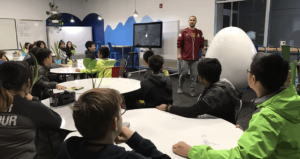Midsize Innovators: Delivering Value at Scale

Startups get all the love on the blogs. With the slow demise of print, the big guys are negotiating the long uneven edu-version of the Innovator’s Dilemma by cannibalizing existing revenue streams with converted or acquired digital product lines. In between, a handful of midsize companies are innovating and delivering value at scale.
Education suffers from the missing middle–very few medium sized companies. Historically, there are a handful of large companies and thousands mom and pop operators, but given the distributed nature of the customer base it has been challenging to scale.
Midsized companies are important because they have enough scale to invest and innovate. They have the capacity to address big problems and partner with big districts to deliver services at scale. They can be big job creators.
The rise of online learning created a new entry point and scaling strategy. K12 and Connections Education both achieved scale. K12 went public in 2007 and Connections was acquired by Pearson in 2011.
The Great Recessions brought an abrupt end to historical textbook adoption cycles starting in 2009. In 2010 Apple released the iPad and the app explosion was on. Consumer Internet strategies became prevent–lean startup, viral video, freemium business models. Funding started flowing to startups and angels flocked to the party.
The Internet era has not only rewarded startups, it has made marketing more efficient for midsize companies. Not weighed down with legacy product lines, midsize companies are often nimble enough to address new technologies and changing policy incentives. The two most notable categories are adaptive instruction and data; and school and teacher effectiveness.
Adaptive instruction. Wireless Generation (now Amplify) achieved scale with formative assessments on handheld devices. They responded quickly to grant opportunities like Race to the Top and were acquired by News Corp in 2011.
Five years ago Curriculum Associates was a workbook publisher and special education assessment provider in a Boston ring suburb. The founder donated most of the stock to a charitable trust and hired Rob Waldron as CEO (more on the backstory). Over the last four years the new team pulled off the impressive product development of two product lines built for the Common Core–an online adaptive instructional system, i-Ready, and an aligned K-8 print series, Ready, for both reading and math. The online adaptive instructional system and print program form a powerful blended instructional duo.
The innovative corporate structure gives Waldron the opportunity to take the long view. They made big bet-the-company investments at the bottom of the recession. The company is now growing at 50% per year and has added 100 EdTech jobs.
Nimble product development, the ability to make big investments, the scale to be responsive to big states and districts are all distinct advantages of medium size innovators like Curriculum Associates.
In the adaptive math category, ALEKS was just acquired by McGraw-Hill. Carnegie Learning was recently acquired by Apollo Group. Dreambox continues to extend it reach (seewhite paperand use case). Think Through Math just closed a second round of financing.
School & teacher effectiveness. School Improvement Network is a Salt Lake City provider of professional development and teacher effectiveness services that makes great use of video and mobile devices. They are marketing and supporting the innovative Buzz platform used the Michigan’s Education Achievement Authority.
Solution Tree is an Indiana-based professional development, book and event provider specializing in professional learning communities. Like Curriculum Associates, Solution Tree and School Improvement are both north of $50 million in revenue and headed for $100 million.
“I don’t worry a bit about what anyone else is doing,” said Solution Tree CEO Jeff Jones. Instead, Jones quotes Mikhail Baryshnikov, “I don’t try to dance better than anyone else. I only try to dance better than myself.” Jones stays focused on impact, “We will prove ourselves each and every day, and we will advance our authors work, so that their work helps educators.
Teachscape , True North Logic, and Bloomboard are “all very real businesses in an important segment all showing healthy growth,” said an edtech investor, “This sector is compelling and gets less exposure.”
While startups and the big publishers get all the attention, it’s medium sized companies like Curriculum Associates and Solution Tree that are driving a lot of the innovation and job creation.
K12, Connections/Pearson, Curriculum Associates and Dreambox are Getting Smart Advocacy Partners. Bloomboard is a Learn Capitol Portfolio company where Tom Vander Ark is a partner.







0 Comments
Leave a Comment
Your email address will not be published. All fields are required.